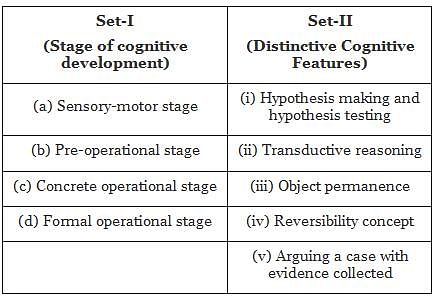Gujarat TET Paper 2: Child Development and Pedagogy Test - 1 (Science and Mathematics) - Gujarat TET MCQ
30 Questions MCQ Test - Gujarat TET Paper 2: Child Development and Pedagogy Test - 1 (Science and Mathematics)
'Special needs education' is the type of education
Assertion (A): Reflex actions such as sucking, grasping inherited by the adults become the building blocks for cognitive learning during pre-logical stage.
Reasoning (R): Piaget believed that adults are active learners who are responsive to stimulation in their environment.
Reasoning (R): Piaget believed that adults are active learners who are responsive to stimulation in their environment.
| 1 Crore+ students have signed up on EduRev. Have you? Download the App |
Monozygotic is to _____ twins as dizygotic is to _____ twins.
Learning outcome depends upon which of the following?
What is the primary difference between Piaget's and Vygotsky's theories of language development?
Ashok is very fond of playing cricket and is very good at it. He is the captain of his college team. He spends long hours playing or watching cricket and never gets tired or bored. Which personal factor is affecting learning in this example?
Case-history method is more effective to study which of the following problem behaviours of a child?
Anupama, a science teacher, often makes linkages in her classrooms with the concepts students are studying in Mathematics. This kind of pedagogy -
Teachers need to create a good classroom environment to facilitate children’s learning. To create such a learning environment, which one of the given statements is not true?
Which of the following is the most important factor in the effective teaching process?
In the following two sets of information, Set-I mentions the stages of cognitive development as given by Piaget and Set-II specified the distinctive cognitive features:

Match the two sets and indicate your answer from the options given below:
On the basis of which principle of learning can the feelings of fear, love and hate be easily generated in the child?
"The curriculum must enable children to find their voices, nurture their curiosity—to do things, to ask questions and to pursue investigations, sharing and integrating their experiences with school knowledge—rather than their ability to reproduce textual knowledge." (National Curriculum Framework 2005, pg-13)
Against this backdrop, what should be the primary role of a teacher?
According to Piaget, which period among the following is the "period of concrete operations"?
Special education is a branch of education that deals with _________.
Karnail Singh does not pay income tax despite legal procedures and expenses. He thinks that he cannot support a corrupt government which spends millions of rupees in building unnecessary dams. He is probably in which state of Kohlberg's stages of moral development?
Which one of the following group of characteristics is not related to creative thinking?
The evaluation in which the evaluation is done by the one who teaches students is:
Determinants of individual differences in human beings relate to which of the following?
Which of the following are criticisms of Kohlberg's theory?
A. Kohlberg proposed a theory without taking gender differences into consideration
B. Kolberg proposed that moral reasoning is developmental
C. Kohlberg did not account for cultural differences in moral reasoning
D. Kohlberg give six clear cut stage of moral development in three levels
Which of the following is a constructive approach for dealing with the 'misconceptions' carried by students?
Directions: Select the most appropriate option.
Which of the following is a critique of theory of multiple intelligences?
Errors made by children are indicative of-
The best way to motivate a child to learn is:
Achievement motivation is
What is the structure of school education as recommended by the National Education Policy 2020?
(i) 5 + 3 + 3 + 4
(ii) 2 + 3 + 3 + 4
(iii) 2 + 5 + 3 + 2 + 2
(iv) 5 + 3 + 3 + 2 + 2
What role should parents play in a child's learning process?
Learning outcome depends upon which of the following?
What is the primary difference between Piaget's and Vygotsky's theories of language development?
A teacher wants her students to know about government schemes through primary sources. Which one of the following schemes is inappropriate?

















